In the era of populism, please get Bitcoin

Reprinted from panewslab
04/08/2025·21DAuthor: Tulip King, Messari analyst
Compiled by: Luffy, Foresight News
Alpha First:
- Maximize your human capital: Find a high-paying position and work hard. Nowadays, your career is the best way to resist inflation.
- Transfer assets from traditional finance to irrelevant alternative assets. Stock markets may remain stable or downward for decades.
- Hoard gold to maintain stability and hold Bitcoin to increase value. In an era of deglobalization and financial repression, both will outperform the market.
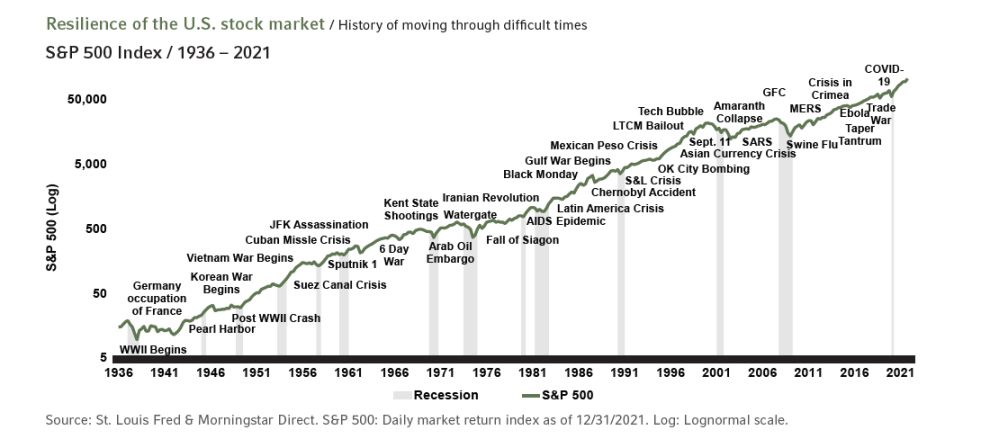
The legendary bull market has ended
We have just experienced the longest bull market in history, from the ruins of World War II to Donald Trump's 2024 victory. This epic bull market has made generations of passive investors accustomed to believing that "nothing will happen" and that "the market will only rise." Unfortunately, good times are no longer and many people are about to suffer a heavy blow. The structural tailwind that has driven this decades of prosperity is not only stagnating, but is also a sharp reversal. The populist revolution has arrived and it will make the labor great again at the expense of capital.
Populists take control of the situation
The globalist neo-conservative political plan led by Clinton → Bush → Obama → Biden's presidency has officially come to an end. Trump stifles it, and its wreckage will not be resurrected.
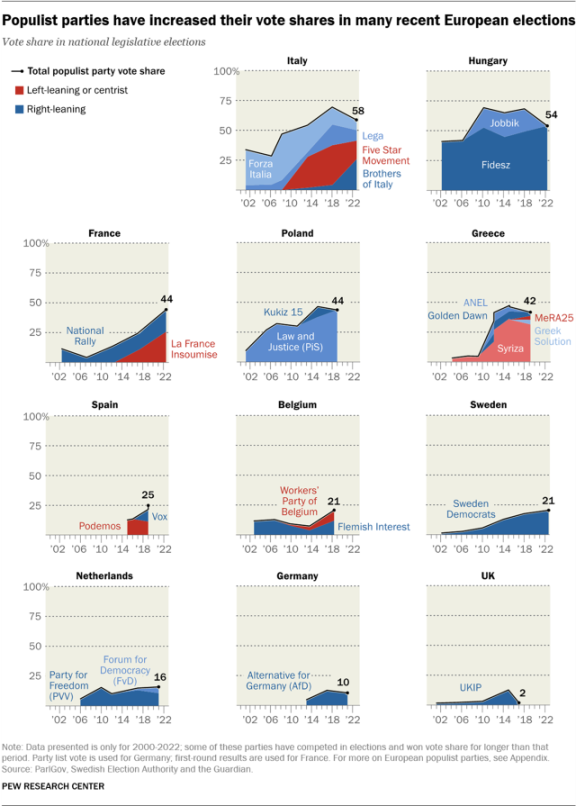
By the way, the shift to populism is not happening only in the United States
A brand new populist political plan emerged in the United States. Today, Trump has completely controlled the Republican Party in a way that he did not have in 2016. Meanwhile, the Democrats are experiencing the kind of intra-party strife that the Republicans just ended, and you can expect that populists will eventually defeat the globalist.
Populist politics is fundamentally different from globalist politics. You need to update your perspective on bipartisan goals. There will still be differences between Republicans and Democrats, but they will increasingly converge on the core populist agenda:
- Admiration for blue-collar work. Both sides are now competing for who loves factory workers more. The era of "learning programming" has passed.
- Reindustrialization. Everyone wants factories, supply chains and key industries to return to the United States.
- tariff. It is expected that the next president, whether from the Republican or the Democratic Party, will continue to implement a foreign policy with tariffs as the core.
- Free trade has become a poison politically.
- Nationalism. The distinction between "citizens and non-citizens" is making a comeback with a more intense momentum. Both parties will continue to restrict immigration and deport illegal immigrants. The difference will only be in range and speed, not direction.
The elite consensus that promoted policy from Reagan to Obama had promised to flourish under the leadership of the United States through free trade, open capital flows and globalization. For financiers and tech tycoons, this has brought amazing results. But for large areas of the United States, especially in the industrial core areas, this has brought about community hollowing out, wage stagnation and fentanyl overflow. Populism is not an accident, it is a foreseeable phenomenon.
The value of labor
Two powerful forces are gathering, driving a sharp rise in wages:
Reindustrialization has caused labor demand to soar. Even with automation, factories and supply chains returning to the local area will create a huge demand for workers. Every newly built semiconductor factory or electric vehicle battery factory requires engineers, technicians, construction workers and logistics personnel. The Chip Act and the Inflation Cut Act alone have injected hundreds of billions of dollars into domestic manufacturing.
Immigration restrictions also reduce labor supply. Whether through border control, deportation or reduced visa approval, the inflow of new workers has been restricted. Republicans want to expel all illegal immigrants; Democrats are at least concessions and agree to deport illegal immigrants with criminal records. Regardless, the trend is obvious: fewer and fewer workers entering the employment system.
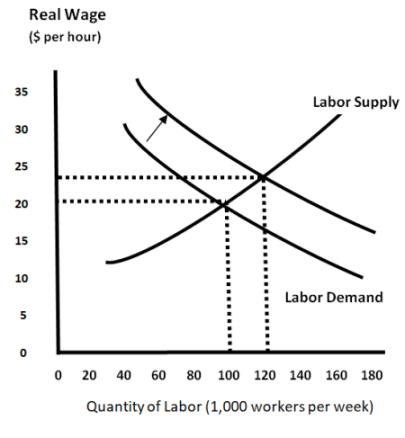
Review the supply and demand curve in the basics of economics
This is the basic economic principle: when labor demand increases and supply shrinks, wages will inevitably rise. This is not a temporary phenomenon, but a structural transformation that may last for decades. For the first time in years, you will see wage increases exceeding inflation and return on financial assets.
This is true even in an inflationary environment. I expect inflation will be between 3% - 9% over the next decade due to deglobalization, tariffs and labor shortages. But if your wages grow 5% faster than inflation every year, rising prices won't keep you awake at night. Your real wealth is growing as asset owners watch their portfolios stagnate.
This means: Now is the time to focus on your career. Work hard and learn valuable skills, especially in areas related to domestic production and physical infrastructure. Your human capital (your ability to make money) is appreciating. This is an intergenerational opportunity to accumulate wealth through income rather than asset appreciation.
Wall Street is out
During the United States' globalist political plan, Wall Street was once the most important interest group. Their interests are regarded as equivalent to national interests. Wall Street enjoys all free capital flows, deregulation, and relief when necessary. It seems that every Treasury Secretary is directly from Goldman Sachs.
Today, as the deglobalization progresses, Wall Street is quickly losing favor at the political and public level. Financial elites are not aware of this, but they have no allies and power from 5-10 years ago. They looked up at the strange light dinosaur in the sky, not understanding that their times were about to pass.
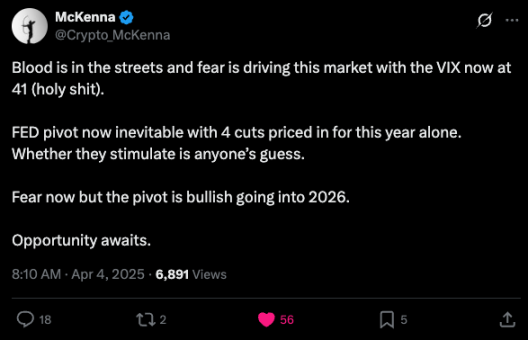
This idea (the Fed\'s turn to a rate cut is inevitable) is wrong, the Fed will not turn
As Wall Street has not yet recognized its decline in status, they still expect the Fed to rescue them when they are in trouble. They assume that the famous "Feder put options" (the central bank's implicit promise to cut interest rates to save the market) remains in effect. But that's not the case.
Since 2021, every politician has learned a key lesson: If you are an elected leader and there is inflation at home, you will lose your reelection campaign. It's that simple. This completely reverses the political motivation surrounding monetary policy. Smart politicians are now putting pressure on the Fed to maintain high interest rates because interest rate cuts may reinflation the economy, which will cause them to lose their jobs.
Even if the market plummets, current political considerations are prioritizing fighting inflation rather than saving asset prices. Wall Street just cry, but in a populist environment, their tears cannot be exchanged for votes. In fact, many voters will cheer for Wall Street’s setbacks. This reality has not been reflected in market prices.
The depression of financial assets
It's time to stop pretending that the stock market is the same as the real economy. While financial assets and stock markets are falling, your salary and quality of life can be improved completely. This is actually ideal for people under 30, and you finally have the opportunity to buy housing and stocks at a reasonable price with rising wages.
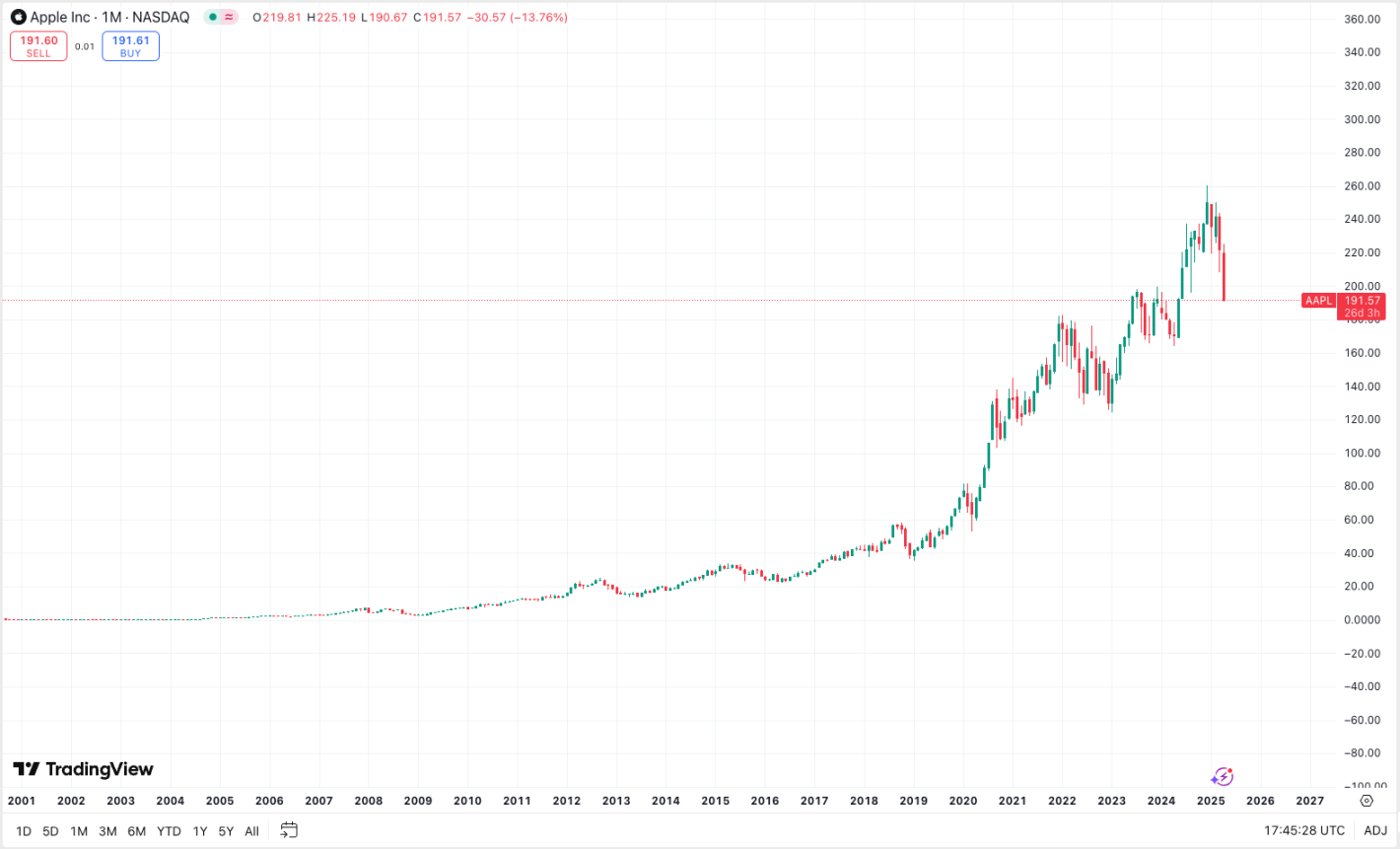
You may never see Apple\'s stock price hitting a record high again
Take Apple as an example. In the fourth quarter of 2024, Apple's price-to-earnings ratio was about 40 and gross profit margin was about 46%. That is, if Apple's revenue per share is about $100, its profit per share is about $46, and its share price is about $1,960.
Now suppose they have to return production and labor to the United States. Due to the low domestic production efficiency, their profit margins will be compressed. Gross profit margin fell to 20%, and in a high interest rate environment, the market will no longer recognize such an aggressive PE ratio, so the PE ratio dropped to 25 (still above the historical average). Suppose over the next decade, since Apple is still an outstanding company, they managed to double their revenue. By 2035, their revenue per share will be about $200, but their profit per share will be only $40 and their share price will be $1,000.
This is how financial assets are trapped in a long-term bear market (over 10 years) while companies are still making profits and giving employees a raise. Even if business activities grow and wages rise, the stock price may actually fall by 50%.
This is not a paper talk, but what really happened in Japan after 1989. That year, the Nikkei hit nearly 40,000 points and then collapsed. Today, 36 years later, it has not yet fully recovered. If you buy Japanese stocks at peak and hold them for a generation, you are still in a loss state by actual value. This happens when a financialized economy based on loose currencies and globalization has to adapt to the new reality.
American financial assets can easily fall into "lost decades" (or even twenty years). Passive investment strategies that are effective for baby boomers may bring miserable returns to the next generation. This will be a nightmare for index fund believers.
So, who is the loser?
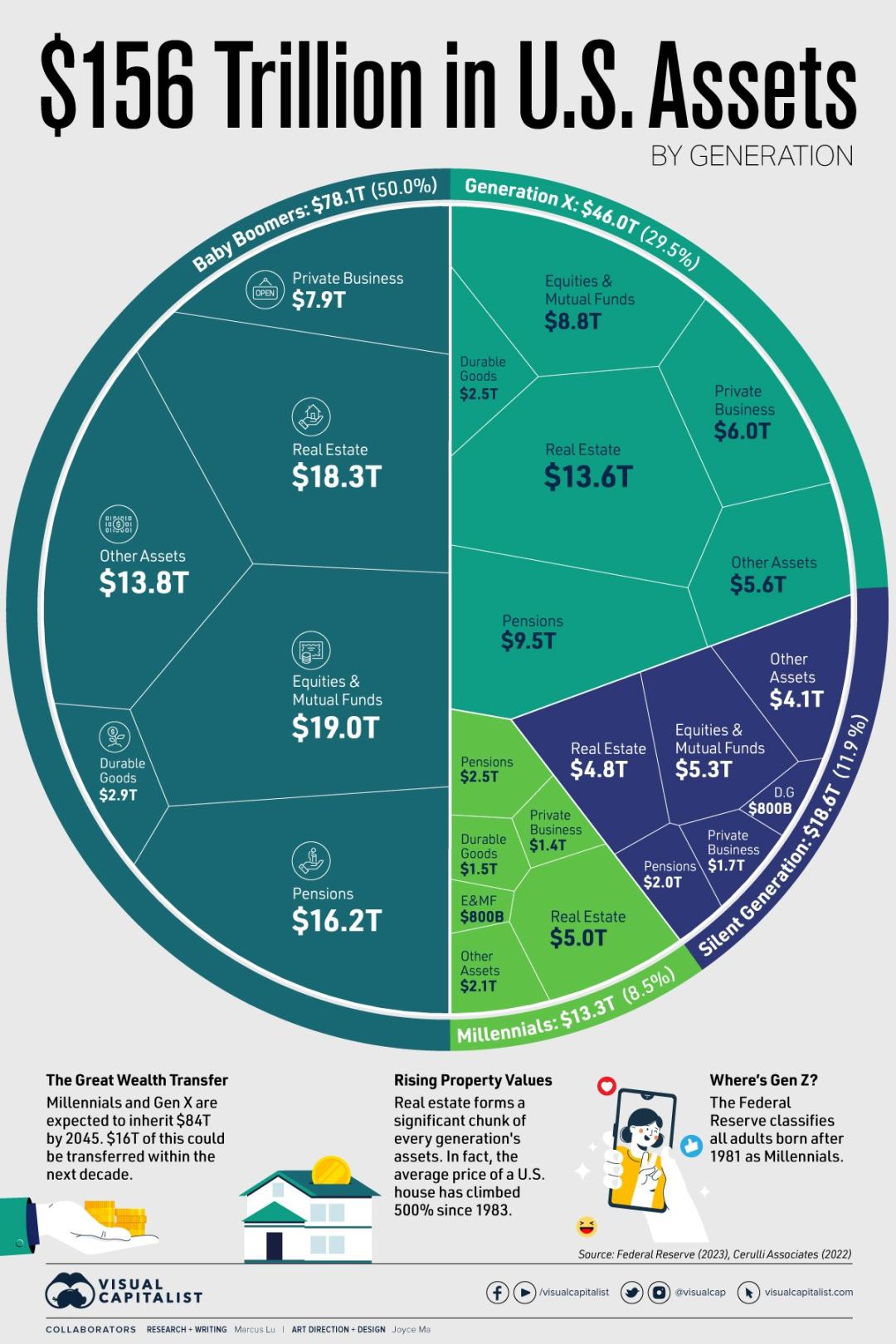
Here is a useful reference for how much baby boomers make from globalist political plans
At this time, you may want to know who will become unlucky in the new political and economic landscape, and there are mainly two groups:
- Large companies with high profit margins. Companies that enjoy the dividends of globalization (outsourcing production, optimizing global supply chains, and paying extremely low wages) face painful adjustments. Production reflux means rising costs, scarcity of labor means rising wages, and tariffs means higher input costs. All of this compressed their previously extremely high profit margins. They will still make profits, but the profits are reduced, and investors will give lower valuations of these reduced profits.
- Baby boomers who are too old to benefit from wage growth. The real victims are retirees and those who are about to retire, with rich assets but small incomes. After decades of policy cater to their interests, the advantages of the baby boomers ended. They have exited the labor market, so the rise in wages doesn't help them. Their retirement accounts are heavily invested in stocks and bonds, and these assets may stagnate or fall for years. Meanwhile, inflation erodes their fixed income. This is a triple blow: assets fall, costs rise, and the inability to earn more income.
It's not just an economic issue, it's an intergenerational fairness issue. Baby boomers enjoyed the fruits of the post-World War II boomers, bought property at a low price, watched their stocks rise 10% every year for decades, and then burned bridges across the river. Nowadays, when they try to cash out these gains, they find fewer buyers. The large-scale intergenerational wealth transfer that many people expect may not be as rich as they imagined.
So, who is the winner?
Under this new paradigm, the winner is obvious:
- Labor, especially blue-collar workers. Electricians, plumbers, welders, mechanics, construction workers, anyone who manufactures or repairs physical objects is expected to make huge gains. These jobs cannot be outsourcing, are crucial to reindustrialization, and the labor competition faces is decreasing. For these workers, the era of wage stagnation is over. They will receive high salaries and regain social status.
- Young people entering the workplace. If you are just twenty years old, this transformation is good for you. You will earn higher wages in your career. After the asset price falls, you will eventually purchase assets (housing, stocks) at a more reasonable valuation. You have decades of making money to benefit from a pro-labor environment. This is much better than when I entered the workplace in 2010, when wages were stagnant but assets were already expensive.
- People who hold unrelated assets such as Bitcoin and gold. As financial suppression intensifies, traditional assets are in trouble, and alternative assets outside the system are becoming increasingly attractive. For thousands of years, gold has been a classic inflation hedge and safe haven. Central banks around the world are already stocking up gold at record rates. Bitcoin, as digital gold, offers a similar role and has greater upward potential. Both can thrive in an environment of financial instability, currency devaluation and geopolitical tension.
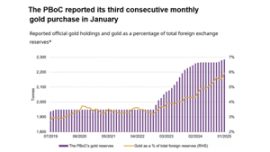
Central banks are buying large amounts of gold
Regarding Bitcoin, it is clear: it is created for this moment, when people's trust in traditional financial institutions is shaken and the government takes increasingly desperate measures to manage debts. When everything else is depreciating, the fixed supply of Bitcoin is extremely attractive. I expect Bitcoin to eventually reach $1 million, but you need patience. This is not a deal to get rich overnight.
New economic order
We are witnessing a historic turning point: the end of the neoliberal globalist order and the rise of populist nationalism. This is not a small policy adjustment, it is a fundamental reshuffle of economic winners and losers.
For decades, capital has dominated the labor force, financial assets outperform wages, and Wall Street has issued orders to Washington. That era is over, and we are entering a period where labor regains influence, wages grow faster than asset returns, and economic policies prioritize workers over investors.
This shift will not be smooth sailing, the market will experience a sharp decline, and inflation will last longer than most people expect. Geopolitical tensions will intensify as countries prioritize their own interests over global cooperation.
But there are opportunities in this turmoil. Focus on learning skills that can earn high salaries in the new economy, moving from overvalued financial assets to irrelevant alternative assets. Prepare for a world where wage checks, rather than portfolios, are the main tools for wealth accumulation.
The populist revolution not only changes politics, it also rewrites economic rules. Those who recognize this transformation early and plan accordingly will gain a lot. Those who are obsessed with old strategies will struggle. This is not the end of prosperity, it is the reallocation of prosperity.


 chaincatcher
chaincatcher